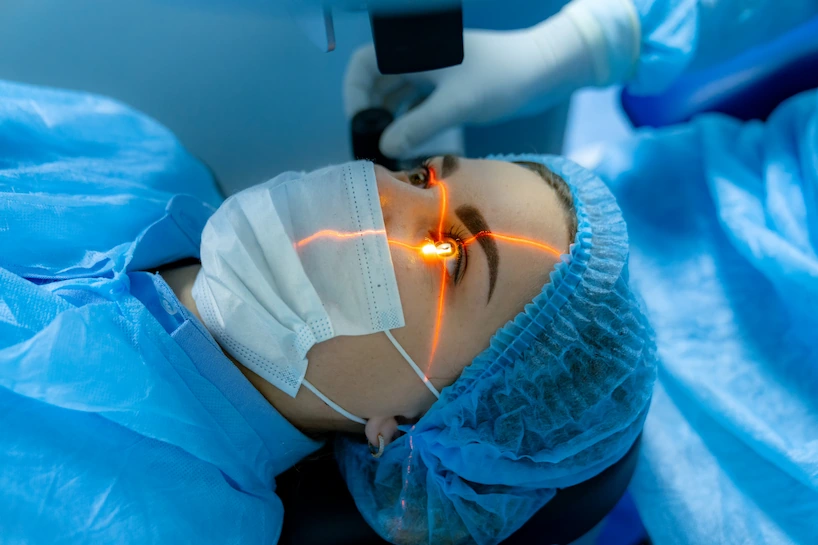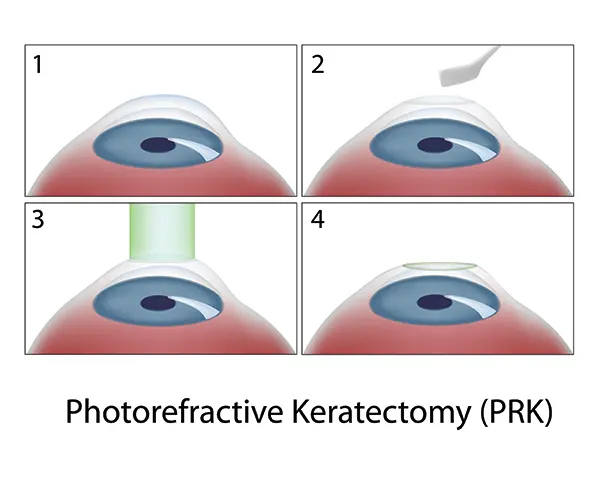PRK
Since PRK was the first vision correction surgery to be approved by the FDA in 1995, millions of people across the world have achieved enhanced vision thanks to this procedure. As part of our mission to deliver extraordinary vision to our patients from Chicago and throughout the Chicagoland area, we rely on the latest advances in laser eye surgery technology to perform PRK and help our patients see the world.


At Kovach Eye we believe in vision without limits.
Are you a candidate for vision correction surgery? Take our LASIK self-test to see if it’s a good fit!
What is PRK Eye Surgery?
PRK, or photorefractive keratectomy, is a laser vision correction surgery designed to improve common refractive errors by reshaping the cornea. The American Academy of Ophthalmology states that PRK makes it possible for many patients to reduce or even
Trusted Source
What is Photorefractive Keratectomy (PRK)?
American Academy of Ophthalmology
Go to Source
eliminate their dependence
on eyeglasses or contact lenses.
What does PRK Treat?
By reshaping the cornea during PRK, our eye surgeons are able to correct all common refractive errors.
The cornea is the thin outermost layer of the eye. When light passes through the cornea, it is focused through the lens onto the retina to produce the images we see. If the cornea is misshapen, it
Trusted Source
Refractive Errors
Cleveland Clinic
Go to Source
prevents the retina
from properly processing images. This results in refractive errors such as:
Nearsightedness (myopia): When a person is nearsighted, the cornea is overly curved or the eye is longer than normal. This results in light focusing in front of the retina, causing blurry distance vision.
Farsightedness (hyperopia): In patients who are farsighted, the cornea is not sufficiently curved or the eye is shorter than normal. This results in light focusing behind the retina, causing blurry near vision
Astigmatism: Astigmatism is caused by a cornea that is irregular in shape, causing light to refract onto the retina unevenly. Astigmatism can affect vision at all ranges.
PRK vs LASIK
LASIK and PRK are both laser vision correction procedures that involve reshaping the cornea to improve a patient’s vision. Both procedures take only
Trusted Source
A Comparison of Visual Outcomes and Patient Satisfaction Between Photorefractive Keratectomy and Femtosecond Laser-Assisted In Situ Keratomileusis
Hashmani N, Hashmani S, Ramesh P, Rajani H, Ahmed J, Kumar J, Kumar A, Jamali M
Go to Source
about 10-15 minutes
, and they have comparable rates of patient satisfaction. What makes PRK different from LASIK is the way the cornea is accessed by the surgeon.
During LASIK, the surgeon makes a small incision to create a flap in the cornea before reshaping it with a laser. During PRK, an alcohol solution is used to remove the entire outer layer of the cornea, called the epithelium, before a laser is used for reshaping.
Because the entire corneal epithelium is removed during PRK, this procedure does have a longer recovery period than LASIK and it takes longer for patients to notice the full extent of their vision correction. However, PRK may be the better option for patients with thin corneas since no corneal flap is created. Patients with very active lifestyles may also be better candidates for PRK, as there is no risk of dislodging a corneal flap after this procedure.

Who is a Candidate for PRK?
Many patients who don’t qualify for LASIK because they have dry eyes or thin corneas may still benefit from PRK. The ideal candidate for PRK:
- Is over the age of 18
- Has a stable vision prescription (no changes in the last year)
- Has healthy eyes
- Has
Trusted Source Photorefractive Keratectomy (PRK) Eye Surgery Cleveland Clinic Go to Source realistic expectations about the outcomes of laser refractive surgery

Preparing for PRK Eye Surgery
The first step to preparing for vision correction with PRK is to undergo an eye exam by an experienced ophthalmologist. The eye surgeon will also review your medical history before determining whether you are a good candidate for PRK. Once your procedure has been scheduled, a member of our team will give you detailed pre- and postoperative instructions.
Please note that patients are not permitted to drive themselves home after PRK eye surgery, so you’ll need to make arrangements for transportation.
The PRK Procedure
The PRK procedure takes only about 10-15 minutes per eye. Before the procedure begins, your eye doctor will apply anesthetic eye drops to numb your eyes. You will also be offered an oral sedative to help you relax. A device will be used to hold your eyes open so you won’t need to be concerned about blinking.
To begin the PRK procedure, the ophthalmologist will gently dissolve the outer layer of corneal tissue (epithelium) using an alcohol solution. Then an excimer laser will be used to reshape the cornea to correct refractive errors.
Following your PRK eye surgery, you will be fitted with a temporary bandage contact lens to protect your cornea as it heals. You will also wear a protective eye shield.

PRK Recovery & Results
Recovery time after PRK is slightly longer than that of LASIK surgery, because the corneal epithelium needs to regenerate. You’ll need to wear bandage contact lenses over your eyes for three to five days.
It is normal to experience discomfort and light sensitivity during the PRK healing process, but this can be managed with prescription and over-the-counter medications. You may also feel itching, burning or grittiness as your eyes heal: please do your best not to touch or rub your eyes. Artificial tears can help enhance your comfort as you heal.
Most of our patients are able to get back to work within two to three days of their PRK procedure, and can resume non-strenuous activity within a week or two. Your doctor will let you know when you can get back to more strenuous activities during your follow-up appointment.
Within a month, you will notice the full extent of your vision correction.

Reviews from Our Patients
Frequently Asked Questions About PRK
Before your PRK procedure, anesthetic eye drops will be administered to numb your eyes. You may feel some discomfort during the healing process, but pain should not be part of your experience.
PRK reshapes the cornea to permanently correct refractive errors like nearsightedness, farsightedness, and astigmatism. However, PRK cannot stop the eye’s natural aging process. Most adults encounter age-related near vision loss, or presbyopia, in their 40s. Additionally, patients are still at risk for developing cataracts after PRK. If your vision needs change after PRK, our ophthalmologists can recommend the proper treatment plan.
PRK is rarely covered by our patients’ insurance plans because it is considered an elective (not medically necessary) procedure. During your PRK consultation, you will receive a detailed cost breakdown for your laser eye surgery. To help our patients fit laser vision correction into their budgets, we offer a number of payment and financing options.
PRK has a high rate of patient satisfaction and is generally considered to be safe. Still, there are risks and complications associated with any surgical procedure. Potential risks and side effects of PRK include:
- Discomfort
- Infection
- Glares or halos
- Decreased night vision
- Under- or over-correction of refractive errors
- Dry eyes
- Hazy or
Trusted Source Main Complications of Photorefractive Keratectomy and their Management Spadea L, Giovannetti F Go to Source cloudy vision

Contact Us
If you are interested in learning more about how you may be able to achieve High Performance Vision after PRK eye surgery, please contact us to schedule a consultation with an experienced ophthalmologist. We are proud to serve patients from Chicago and throughout the Chicagoland area.
1 American Academy of Ophthalmology. What is Photorefractive Keratectomy (PRK)?. Available: https://www.aao.org/eye-health/treatments/photorefractive-keratectomy-prk. Accessed February 13, 2023.
2Cleveland Clinic. Refractive Errors. Available: https://my.clevelandclinic.org/health/diseases/24224-refractive-errors. Accessed February 13, 2023.
3 Hashmani N, Hashmani S, Ramesh P, Rajani H, Ahmed J, Kumar J, Kumar A, Jamali M. A Comparison of Visual Outcomes and Patient Satisfaction Between Photorefractive Keratectomy and Femtosecond Laser-Assisted In Situ Keratomileusis. Cureus. 2017 Sep 1;9(9):e1641. doi: 10.7759/cureus.1641. PMID: 29119072; PMCID: PMC5665689. Available: https://pubmed.ncbi.nlm.nih.gov/29119072/. Accessed February 13, 2023.
4 Cleveland Clinic. Photorefractive Keratectomy (PRK) Eye Surgery. Available: https://my.clevelandclinic.org/health/treatments/8596-photorefractive-keratectomy-prk-eye-surgery. Accessed February 13, 2023.
5 Spadea L, Giovannetti F. Main Complications of Photorefractive Keratectomy and their Management. Clin Ophthalmol. 2019;13:2305-2315. Published 2019 Nov 27. doi:10.2147/OPTH.S233125. Available: https://www.ncbi.nlm.nih.gov/pmc/articles/PMC6885542/. Accessed February 13, 2023.
The doctors at Kovach Eye Institute have either authored or reviewed and approved this content.
Page Updated:


